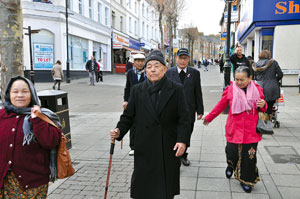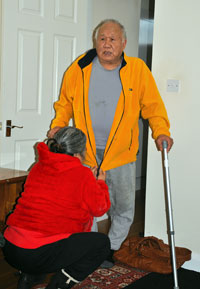 PICS: BADRI PAUDYAL ON OUR OWN: Phangla and Surdhoj Rai (front, L-R) taking an evening stroll in the neighbourhood with their friends Bhim Bahadur, Bam Bahadur and Lalmaya Gurung . |
3000 more reside in nearby Farnborough. Towns like Reading, Plumstead and Wembley which are closer to London also have comparable Gurkha population.
Many families moved to the UK after May 2009's landmark ruling granted residency rights to Gurkhas who retired before 1997, and who had served at least four years in the British Army, along with their wives and children under 18.
Despite respectable and relatively comfortable lives in Nepal, they left their homes, relatives and friends to resettle in England in hopes of better state benefits, free healthcare, greater savings and educational and employment opportunities for their children.
Ex-Gurkha servicemen have struggled for years to receive equal pension, allowance, and citizenship rights as their British counterparts. However, even after winning important legal battles, their quality of life remains poor. Fulfilling the 'British dream' has been especially difficult for older veterans and their wives.
Language barrier, lack of workplace skills and qualifications, along with diminishing physical abilities put elderly couples in an extremely vulnerable state. Although the British government permits some veterans to bring their
18-plus children under 'special circumstances' or after winning court cases, most parents over 60 years migrate on their own. Living without children or caretakers becomes their biggest challenge.
"We got our rights, but have no one to look after us. We are helpless," says 74-year-old Bhim Bahadur Gurung from Thulo Pelkachaur in Syangja district who came to the UK 18 months ago with his wife Lalmaya. The Gurungs had to leave behind their two daughters and a son in Nepal because they were over 18.Whenever Bhim Bahadur and Lalmaya visit hospitals, the doctors simply prescribe medicines and send them off. Since they don't speak English and don't have a caretaker, they are unable to explain their problems and are denied proper care. "We have to pay extra to hire a translator. If we had our children or a relative, our lives would be easier," says Lalmaya.
83-year-old Surdhoj Rai and his wife Phangla from Khadbari, Sankhuwasabha share a similar story. Rai suffers from a fractured back and poor eyesight, but he can't describe his pain to the doctors. When Phangla falls sick, there is no one to cook and they sleep on empty stomachs. They have five children back in Nepal.
Another father of five, Jeet Bahadur Sunuwar who is originally from Ramechhap district and owns a house in Kathmandu is a diabetes, blood pressure and arthritis patient and is confined to his wheelchair most of the time. His wife Lalmaya is recovering from breast cancer operation and is also not fully healthy. "There is no use giving us rights if our children don't get the same rights as well," says Lalmaya Sunuwar.
There are numerous couples in Aldershot like Gurungs, Rais and Sunuwars who have no one to turn to in case of emergency. Although there are plenty of organisations dedicated to the welfare of retired Gurkhas, none have paid much attention to the plight of elderly veterans and their demands to bring adult children have been largely ignored.
Krishna Kumar Rai, Chairman of Gurkha Army Ex-Servicemen's Organisation (GAESO) says his agency helps out elderly veterans by accompanying them to banks, hospitals and government offices. GAESO, which has brought the largest number of veterans to the UK, also offers two-hour English classes once a week. However, these efforts are not adequate considering the large number of ageing Gurkhas.
 Lalmaya Sunuwar helping her husband Jeet Bahadur with his jacket. |
Prakash Gurung, public relations officer at British Gurkha Welfare Society (BGWS), however, argues that instead of fighting for the rights of residency of children over 18, ex-Gurkhas should demand for pension that is on par with other British servicemen.
"If Gurkhas received as high a pension, most would not even migrate to the UK. This way the host government wouldn't have to bear additional responsibilities," he explains. The case for equal pension is currently in the European court.
Gyan Raj Rai of United British Gurkhas Ex-Servicemen's Association insists that the British government compensate Gurkhas who retired before 1997 for all the years they lost fighting for settlement rights and the resulting difficulties.
To make matters worse, anti-Gurkha sentiments have been on the rise in the past few years and Aldershot youth are using Facebook to express their discontent. And it's not just commoners; even local leaders see the arrival of new Gurkha settlers as a burden on their cities' limited resources. Aldershot's Member of Parliament, Gerald Howarth has repeatedly requested the prime minister to spread out the Gurkha population across the country like refugees.
The next five to six years are going to be tougher for elderly Gurkha couples. As their health deteriorates they will have to be placed in nursing homes, which will put them under greater financial pressure. And the responsibility of performing last rites or taking the body back home will fall solely on the surviving spouse.
Read the original Nepali version here
See also:
The resistants, SITA MANDEBA in DHARAN
The fight for equality opened doors for the Gurkhas to settle in the UK, but the towns back home are now deserted
Ae Gorkhaliharu, TOM OWEN-SMITH
Britain's gain is Nepal's loss


